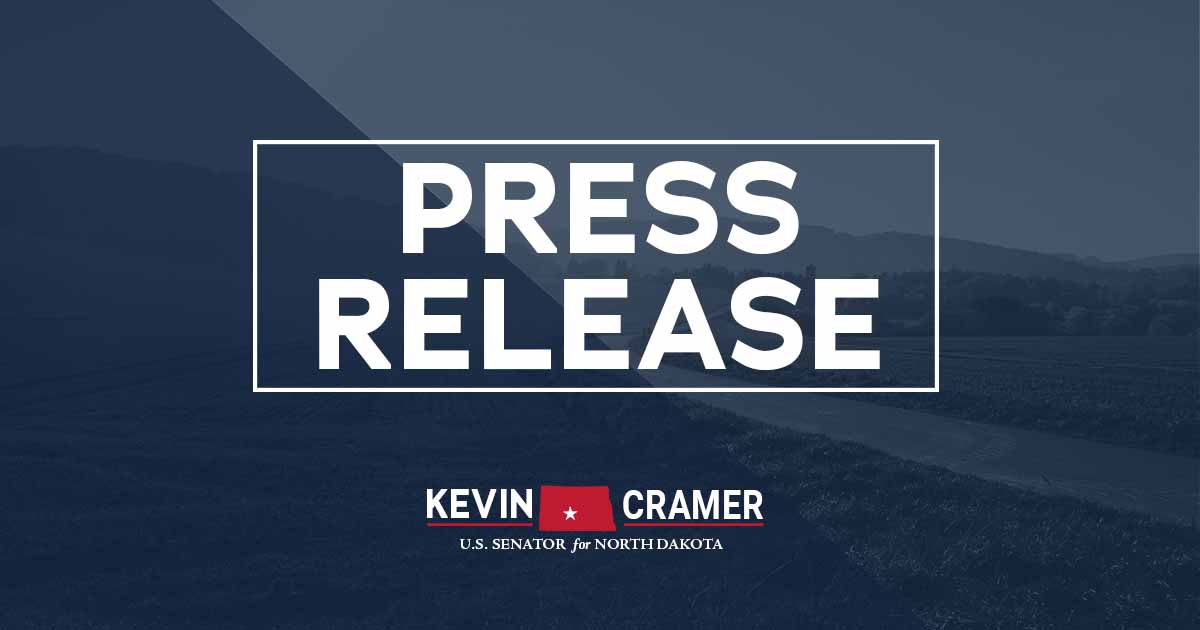Source: United States Senator Kevin Cramer (R-ND)
WASHINGTON – U.S. Senator Kevin Cramer (R-ND) introduced the Travel Nursing Agency Transparency Study Act. The legislation requires the Government Accountability Office (GAO) to conduct a study and report to Congress on the business practices and the effects of hiring agencies across the health care industry during the COVID-19 pandemic.
The health care industry was already experiencing a shortage of professionals prior to the pandemic, but COVID-19 exacerbated this issue throughout the country, especially in rural communities. Travel nurses were employed to help meet the rising demands. Over the past few years, there have been anecdotal reports of hiring agencies inflating prices and monopolizing the nursing workforce, potentially leading to a number of concerning consequences for providers, patients, and taxpayers, including inflated prices for care, further nursing shortages, and continued strain on the entire health care system.
“Nurses serve on the front line and provide an essential service to our communities, especially during the COVID-19 pandemic. However, hiring agencies are reportedly taking advantage of the demand created by workforce shortages, charging inflated rates, and keeping a significant percentage for their own profits. Such business operations of these agencies could have far-reaching effects on the quality of our health care system in rural America and must be reviewed. When health care providers pay travel nurse agencies, both the providers and the contracted nurses should know how much the agencies keep for themselves. The Travel Nursing Agency Transparency Study Act ensures the business practices of these agencies get the critical sunshine they need. The American people and the entire health care industry deserve a better understanding,” said Senator Cramer.
The Travel Nursing Agency Transparency Study Act is supported by the North Dakota Medical Association (NDMA), North Dakota Hospital Association (NDHA), and American Hospital Association (AHA).
“The North Dakota Medical Association supports efforts to reduce health care costs and supports Senator Cramer’s efforts to analyze the practices of travel nursing agencies and how it impacts health care and costs. This is a complex issue and deserves a closer look. NDMA is grateful to Senator Cramer for recognizing the situation and bringing the issue forward,” said North Dakota Medical Association Executive Director Courtney Koebele.
“Hospitals in North Dakota were already experiencing workforce challenges before COVID-19 came along and made them worse. Ballooning wages and the disparity in agency nurse and staff nurse wages over the past two years have grown to a crisis level. The high fees paid to these staffing agencies are simply unsustainable. We support Sen. Cramer’s proposal to study the business and payment practices of nurse staffing agencies to better understand how such extreme prices negatively affect patients and hospitals and to find solutions that prevent conduct that only makes the nurse shortage worse,” said North Dakota Hospital Association President Tim Blasl.
“Travel nurse staffing agencies are charging hospitals and health systems unsustainable rates during the pandemic. The resulting financial burden makes it harder to maintain the clinical staff needed to care for patients, especially in rural communities. We thank Senator Cramer for his leadership in calling for a thorough study of these agencies’ problematic practices,” said American Hospital Association Executive Vice President Stacey Hughes.
These allegations are particularly concerning given the increased demand we are seeing for health care workers in rural settings as we continue to transition out of the COVID-19 pandemic. Like many issues facing remote and rural areas, the workforce shortages ultimately have an outsized influence on rural and underserved areas like North Dakota. According to the New York Times Magazine, “As I.C.U. beds in city hospitals filled up and staff nurses started leaving in droves, another story of a precariously overextended health care system was unfolding in smaller hospitals across the country. Rural hospitals, which have long sent their most acute cases to larger hospitals, were left with patients they were ill-equipped to handle. Many of these hospitals, with lower profits and wages, struggled to retain nurses.”
A November 2021 letter from Senators Mark Kelly (D-AZ) and Bill Cassidy, M.D. (R-LA) to COVID-19 Response Team Coordinator Jeffrey Zients said, “We are writing to inquire about the extreme prices being reported for nurse staffing agencies from hospitals in our states, and the concern that certain staffing agencies may be taking advantage of these difficult circumstances to increase their profits at the expense of patients and the hospitals that treat them. We have received anecdotal reports that the nurse staffing agencies are vastly inflating price, by two, three or more times pre-pandemic rates, and then taking 40% or more of the amount being charged to the hospitals for themselves in profits.”
The profits of travel nurse agencies during the COVID-19 pandemic have been reported by media. According to Kaiser Health News and NBC, “Last year was particularly profitable for staffing agencies. Cross Country Healthcare, one of the few publicly traded companies that staff travel nurses and other health care workers, posted a profit of $132 million in 2021, compared with a loss of $13 million the previous year and even bigger losses in 2019.” According to Time, “AMN Healthcare Services reported its gross profits were $434 million in the fourth quarter of 2021, up 109% from a year prior, according to an annual earnings report. Its net income, which takes into account all business related expenses and taxes it had to pay, was $116 million, an 1100% increase. Another healthcare staffing agency, Cross Country Healthcare, saw its revenue increase 93% between the third quarters of 2020 and 2021. It also reached $1 billion in annual revenue for the first time in the company’s history in 2021.”
Click here for bill text.
